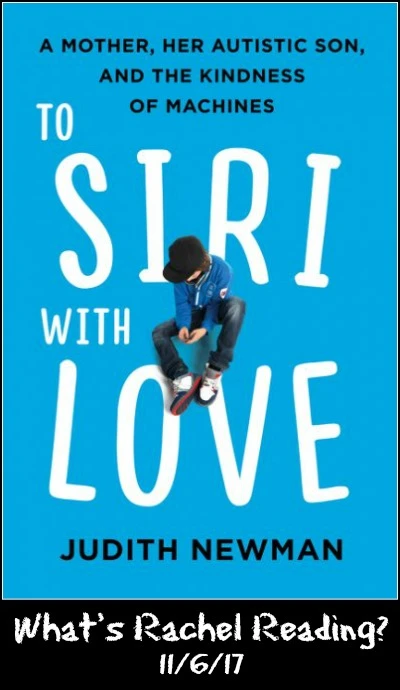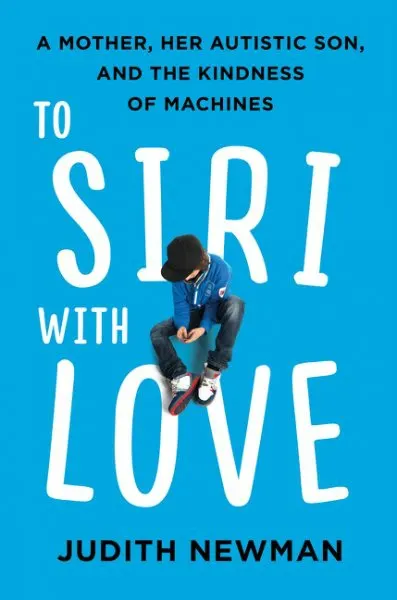Why yes, I am a sucker for a clever book title -- but you probably could have guessed that much already. The book To Siri with Love: A Mother, Her Autistic Son, and the Kindness of Machines grew out of a viral 2014 New York Times op-ed of the same name by Judith Newman. In her initial article, she discussed the relationship her (then-13-year-old) son with autism had developed with Siri, the "intelligent personal assistant" on the iPhone:
Gus had never noticed Siri before, but when he discovered there was someone who would not just find information on his various obsessions (trains, planes, buses, escalators and, of course, anything related to weather) but actually semi-discuss these subjects tirelessly, he was hooked. And I was grateful. Now, when my head was about to explode if I had to have another conversation about the chance of tornadoes in Kansas City, Mo., I could reply brightly: “Hey! Why don’t you ask Siri?”
It’s not that Gus doesn’t understand Siri’s not human. He does — intellectually. But like many autistic people I know, Gus feels that inanimate objects, while maybe not possessing souls, are worthy of our consideration. I realized this when he was 8, and I got him an iPod for his birthday. He listened to it only at home, with one exception. It always came with us on our visits to the Apple Store. Finally, I asked why. “So it can visit its friends,” he said.
Not only does Siri help Gus keep order in his world and tirelessly answer his questions, she also helps teach him back-and-forth conversational skills with the tireless patience his caregivers lack -- being only human, after all.
Kids and technology
Here's some serendipity for you; while reading To Siri with Love, I also kept running across articles and interviews with vaguely threatening titles about the relationship between children and technology. These included:
- Alexa, Are You Safe For My Kids?
- I spent my career in technology. I wasn't prepared for its effect on my kids.
- Have Smartphones Destroyed a Generation?
Of course neurotypical children interact with technology and integrate it into their lives differently than a person with autism might, but I think we tend either to demonize or to idealize the role of technology in our lives -- refusing to acknowledge that modern life and the various ways in which we interact with technology are more complicated than that.
So, beyond the initial cleverness of the title, I originally picked up To Siri with Love because I've always been interested in the ways in which technology tends to shape us as much as we shape it. Going into the book, I hoped to read more on topics like: How Newman's son's relationship with Siri had developed in the years since she wrote the New York Times piece, how developments in technology since then had affected him, whether others in the autism community had similar experiences with Siri and/or other modern technology, and whether she still subscribed to the same view of Siri's positive impact on his life.
The title misleads...
I learned less about the answers to these questions than I would have liked; Siri (and technology in general) take up a very small portion of the book, which largely rehashes the original article. What To Siri with Love does provide, however, is an engrossing and honest look into Newman's life as she raises twin boys, one (Gus) with autism and one (Henry) neurotypical -- and Newman proves to be a great storyteller as she draws us into this particular slice of their daily lives.
Newman is nearly a single parent, due to an unconventional marriage in which her (much older) husband maintains his own apartment and life separate from her and their children, choosing not to become overly involved in the boys' day-to-day lives and the struggles involved in raising a child with autism. Single parent or no, however, she is clear about her own privilege in being able to hire everyone from caregivers to help out with Gus to lawyers to help her take on the New York educational system -- and one thing I did appreciate throughout To Siri with Love was the emphasis on this being the story of just one family living with autism, and the concomitant acknowledgment that every person with autism is unique. As Newman points out from the outset: "The phrase 'When you've met one person with autism, you've met one person with autism' is a favorite in the ASD [autism spectrum disorder] community."
Worth the read
Overall, even though To Siri with Love was not exactly the book I expected, it turned out to be a insightful exploration of the struggles of modern parenthood as written by someone raising two very different boys. Newman's writing style is by turns raw, humorous, and informative as she herself careens between various emotions and parenting challenges, and she provides an unflinching look at her own reactions to the issues and questions Gus' various quirks bring to light. Recommended.
You can watch a short interview with Judith Newman (and catch some glimpses of Gus) on the Today Show here.
What are you reading this week?
What have you been reading lately? Tell us all about it! And, you can browse all of the What’s Rachel Reading? book reviews here.



